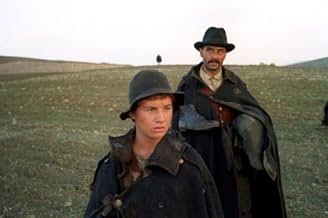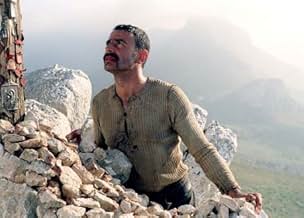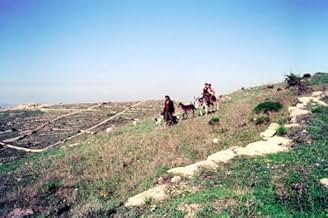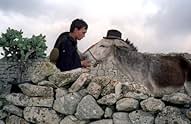Un campesino siciliano comienza el viaje hacia la tierra prometida y conoce a una bella inglesa. Ninguno está preparado para vivir la dura realidad de Ellis Island. ¿Podrán cruzar la puerta ... Leer todoUn campesino siciliano comienza el viaje hacia la tierra prometida y conoce a una bella inglesa. Ninguno está preparado para vivir la dura realidad de Ellis Island. ¿Podrán cruzar la puerta dorada hacia la América de sus sueños?Un campesino siciliano comienza el viaje hacia la tierra prometida y conoce a una bella inglesa. Ninguno está preparado para vivir la dura realidad de Ellis Island. ¿Podrán cruzar la puerta dorada hacia la América de sus sueños?
- Dirección
- Guionista
- Elenco
- Premios
- 22 premios ganados y 29 nominaciones en total
- Il Gatto
- (as Paride Benassai)
- Dottore
- (as Giuseppe Cutino)
- Mangiapane
- (as Massimo La Guardia)
- Dirección
- Guionista
- Todo el elenco y el equipo
- Producción, taquilla y más en IMDbPro
Opiniones destacadas
The film begins with scenes in a poor, rural region of Sicily. We always hear that Sicily is a rocky island, but you won't really understand the implications of that phrase until you see the first half-hour of "The Golden Door."
The middle section of the film is devoted to the long voyage to the U.S. Most immigration films show us ten minutes of people in the third-class section becoming seasick, and then show us the Statue of Liberty. Not this movie--we get a sense for life below decks, and it isn't charming. (We never actually see the Statue of Liberty, either.)
Finally, the typical movie will give us another ten minutes of Ellis Island, and then the immigrants are walking through New York's Lower East Side. Not here--the Ellis Island experience occupies about one-third of the footage.
Vincenzo Amato is outstanding as Salvatore Mancuso, who is bringing his two sons and his mother to the new world. Charlotte Gainsbourg is equally good as Lucy Reed, a mysterious Englishwoman who also speaks fluent Italian.
There are some strange touches in the movie, especially the sound track with songs by Nina Simone. There must be some symbolism there, but I couldn't make sense of it.
Another reviewer has already pointed out that this film will do better viewed in a theater rather than on DVD. Still, large screen or small screen, it's worth seeking out.
Saw this movie last year and found it inspiring that hopeful immigrants, like my Italian grandparents who came through Ellis Island at the turn of the last century, would subject themselves to all manner of invasive inspection just to enter America.
It was certainly eye opening, since my grandparents never spoke of anything terrible while there. My grandmother was 5-years old and my grandfather 18 when they arrived.
I just returned from a trip to New York where I had the pleasure of visiting Ellis Island and the museum actually walks you through the immigration evaluation process - The filmmaker obviously did his research, right down to the medical exams and equipment, questions and puzzles. They are all there at the museum. Even the wedding pictures and the review board room -- Factually correct! Anyone who has immigrant grandparents should see this movie. Inspirational to say the least.
Therefore, it started a debate about the too much intense flow of immigrants from Romania, generalizing them as criminals, everyone, indiscriminately.
I'm only 15, but I thought: what idea of affluence does Italy give to these poor people? How ever do they regard us as the Land of Plenty? Yesterday evening I finally saw NUOVOMONDO, and my question had an answer. When you have only a donkey and some goats, those propaganda postcards showing United States as a land with milk rivers and huge vegetables, makes such an impression.
NUOVOMONDO is really a must-see film. It balances an ethereal symbolism (milk rivers, glances' play, hard and rocky mountains, the name and character Lucy/Luce) and a cruel realism (the mass of hopeful people on the ship, the procedures at Ellis Island). There's a mixed cast, going from the angelic Charlotte Gainsbourg to the realistic Vincenzo Amato, till a bitter and smashing Aurora Quattrocchi as the mother. But was it really so hard to enter in the New World?
Guided by letters he read of immigrants sent to relatives who remained at home, Crialese identifies with those impoverished immigrants who were able to see the positive side of things beyond their ordeal. To Salvatore Mancuso (Vincenzo Amato) and his older son Angelo (Francesco Casisa), America is a distant dream that they know nothing about. After climbing a rocky mountain to pray to the saints for a sign, they are rewarded when they are shown post cards by Salvatore's younger son, Pietro (Filippo Pucillo), a deaf mute, that depict the new world as a land where they can bathe in rivers of milk, sit under a money tree, or harvest giant onions and carrots.
After disposing of their animals in exchange for shoes and suits, Salvatore, his two sons, and his elderly mother Fortunata (Aurora Quattrocchi) set out on their adventure with more hope than trepidation but the equation soon shifts the other way. As they board the boat and settle into their crowded third-class steerage compartments, the most-talked about scene in the film takes place. Using an overhead camera that shows masses of people standing, as the ship pulls away, the frame is divided into those aboard the ship and those waving goodbye from the dock and the way they are separated implies they are being torn asunder from everything familiar.
Aboard the ship is a mysterious English woman named Lucy (Charlotte Gainsbourg). Crialese does not reveal her past or the reason she is traveling to America but she seems to stand for the onset of the modern world they are entering. Though they eye each other cautiously, Lucy becomes interested in Salvatore and asks him to marry her in order to allow her to enter the country. The voyage is treacherous with a violent storm buffeting the ship. Shot in almost complete darkness, passengers in steerage are tossed against the side of the boat and, afterward, bodies lie tangled and twisted on the floor as if in a macabre Totentanz. The rite of passage through immigration processing at Ellis Island does not become any easier and Crialese attacks the way illiterate peasants, in the name of preserving "civilized" society, are forced to put puzzles together, perform mathematical tasks, and undergo humiliating medical examinations to prove they are "fit".
A marriage brokering ceremony feels like an auction block and the young women look despondent when they are matched with overweight middle-aged men. This is the only way they can enter the "Golden Door", however, since single women are rejected unless they have partners, ostensibly to prevent the threat of prostitution. Through the fog the immigrant's can barely see the land of milk and honey and there is no Statue of Liberty asking for the tired and the poor, the humbled masses yearning to breathe free. In their imagination, however, the river is still flowing, waiting for them to jump in. Though the ending is ambiguous and one door opens on to a blank wall, another door symbolizes a rebirth of the soul and the passage we must all take from the old world to the new.
I got drawn to this movie because it tells of immigrants from Sicily who traveled to America. I imagine much the same as my Grandfather did at that time. Travelling in steerage to provide ballast for the ships, I cannot imagine it was very comfortable, as shown in this film.
Laws restricting immigrants existed. I would guess that these laws were more strict on those who came from the Mediterranean and Africa. Immigrants had to be free from contagious diseases or hereditary infirmities. In the film, we see physical and mental exams, the latter because of the view that low intelligence is heritable. Single women could not enter the country, on the presumption that they would become prostitutes, so most married single men already in the country, as arranged beforehand, at Ellis Island before entry.
This is the story of a British immigrant (Charlotte Gainsbourg), who arranges to marry a poor Sicilian (Vincenzo Amato). He is trying to get his family through with a son that is mute and a mother (Aurora Quattrocchi) that is considered feeble-minded. She was fantastic in the role, by the way.
You will also see character actor, Vincent Schiavelli, in his next to the last appearance. I don't know if his last film has been released. He plays a matchmaker, and is also very good.
It was a strange, but enjoyable film. It's not for everyone, as I imagine those who don't have some interest in the immigrant experience would find it rather slow.
¿Sabías que…?
- TriviaDirector Emanuele Crialese personally chose every one of the 700 extras who appeared in the film. He said he was looking for people who could evoke the same facial expressions of the actual immigrants whose photographs Crialese came across when he was researching the film.
- Citas
Lucy Reed: Madam? Madam. Could you lower your voice? I have a headache.
Fortunata Mancuso: Then have one! What do I care? Who does she think she is? This is the last thing I need. A journey like this ahead and she has a headache.
- Bandas sonorasFeeling good
Words and Music by Leslie Bricusse and Anthony Newley, Adapted and Performed by Nina Simone
Selecciones populares
- How long is Golden Door?Con tecnología de Alexa
Detalles
- Fecha de lanzamiento
- Países de origen
- Sitios oficiales
- Idiomas
- También se conoce como
- Golden Door
- Locaciones de filmación
- Productoras
- Ver más créditos de la compañía en IMDbPro
Taquilla
- Presupuesto
- EUR 10,000,000 (estimado)
- Total en EE. UU. y Canadá
- USD 1,070,769
- Fin de semana de estreno en EE. UU. y Canadá
- USD 27,744
- 27 may 2007
- Total a nivel mundial
- USD 7,228,273
- Tiempo de ejecución
- 1h 58min(118 min)
- Color
- Mezcla de sonido
- Relación de aspecto
- 2.35 : 1
































